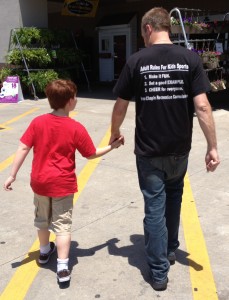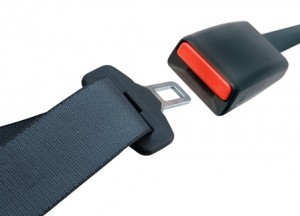 The other day, during my travels, I had to visit a restroom in a run-down gas station. Public bathroom visits are never a preferred option but gas station bathrooms, for most sane human beings, are to be avoided at all costs. Sadly, it was either visit this glorified outhouse on my long road trip or wet my pants. I actually thought about the latter option.
The other day, during my travels, I had to visit a restroom in a run-down gas station. Public bathroom visits are never a preferred option but gas station bathrooms, for most sane human beings, are to be avoided at all costs. Sadly, it was either visit this glorified outhouse on my long road trip or wet my pants. I actually thought about the latter option.
The men’s room in a gas station is consistently nasty. Whereas I have heard that female restrooms are colorful, fragrant epicenters of happiness – the men’s room is where all things nasty go to die. Chipped paint on the walls, graffiti i messages on the doors, cracked mirrors, leaky faucets and trash littering the floor are commonplace sightings. What can you expect from an understaffed, underpaid place where men who can’t aim go to dump their waste? Upon entering the bathroom and walking over the paper towel trash pile inevitably left on the floor, every man instinctly looks for the open urinal or stall. Whereas women like to travel to a restroom en masse, men prefer it to be a solo experience.
On this particular day, there was only one stall available between two oversized men. Ugh. I reluctantly saddled over to the lone urinal, annoyed that I cannot take care of business with more privacy and realized immediately why this stall was ominiously “available.” At the bottom of this urinal, seemingly strategically placed in this odd place, was a picture of Abraham Lincoln. After all, his picture, familiar to us all, is the image on every five dollar bill.
In most men’s rooms – there is a shortage of things to look at while you are… making the bladder gladder. But when you are in there with other men, it is imperative that you are very careful not to let your eyes wander East or West.This particular day, my gaze was fixed upon Lincoln. I wondered who had put a $5 bill in the urinal. Was this some sort of reality show prank and I was unwittingly their next contestant? I wondered if it was a crime to “Number One” on Honest Abe in this fashion. I wondered how long it had been there and why no one had rescued it from its cruel fate. Actually, I didn’t wonder about that one too long.
A plethora of thoughts filled my head about the unfortunate bill. (Clearly I drank too much that afternoon.) I considered its unfavorable position. I pondered its unfriendly treatment. I wondered where it had been prior to this. I wondered what things it was able to do in the past. When it came off the press at the Mint, it had a bright future. Certainly this isn’t what the makers of the money had in mind for this particular piece of currency?
As I reflected the deeper meaning behind this bill’s fate, a prominent thought came to mind:
There are many days when I relate to this bill.
Stuck.
Misplaced.
Mistreated.
Undervalued.
Unfulfilled.
Used.
Abused.
Not fulfilling the purpose for which I was created.
Do you relate? If you’re honest, you probably have felt this way too, especially if you have spent time at the bottom of life’s urinal.
Noah had to relate to this feeling when he was called by God to build an ark prior to the impending flood. The only problem is that no one had ever seen an ark or flood before. God failed to mention it would take him over 100 years to build. I can only imagine the ridicule he faced for a century on this “project from God.” (Genesis 6)
Joseph had to relate. After experiencing lofty dreams about his bright future, he finds himself languishing in an Egyptian prison for two years – with no forseeable hope of getting out. (Genesis 37-40)
David had to relate. Annointed to be the next King of Israel (I Samuel 16), he spent the next 20 years of his life as a fugitive waiting for the day that the annointed would finally be appointed.
Paul had to relate. Called by God in spectacular fashion (Acts 9), he eventually finds himself incarcerated for his newfound faith and pastoring several churches while in chains.
Hosea had to relate. Called by God to marry a prostitute, he spends his entire marriage to someone trying to love them in spite of wayward unfaithfulness. If anyone felt “stuck” in a relationship, it had to be him.
The list of biblical characters that seemingly felt mistreated, used, forgotten, is endless.
Over the last few years I have really struggled with my sense of worth. When you commit major league sins in the midst of minor league sinners (church folk), it can mess with your perception of worth. Whereas I used to be Christianity’s darling because I could write, speak and spin all the necessary spiritual plates, I have found myself on the other end of respect, stuck like a piece of gum on the bottom of self-righteous religious shoes. The people I used to lead don’t follow. The ones that used to take notes have stopped listening.
Here’s the thing that $5 dollar bill taught me that day. It’s a profound truth, if you stop long enough to absorb it.
It’s still worth $5 dollars.
It’s not worth less because it’s at the bottom of a urinal.
It’s not worth less because of it’s level of abuse or misuse.
It’s not worth less because no one wants to touch it anymore.
It’s still, all day long, worth $5 dollars, simply because it has intrinsic value.
Intrinsic.
Look that word up in the dictionary.
(adjective) in·trin·sic, belonging naturally; essential, innate, inborn, comes from within, built-in, inherent.
In other words, it means belonging to a thing by its very nature.
Dogs are intrinsically loyal. Cats are intrinsically independent. God is intrinsically loving.
Sometimes I forget this truth, imbedded into the D.N.A. of every human being, myself included.
There is no crime that can remove my intrinsic value. There is no sin that can erase one’s essential worth.
Not.one. So, dear reader, be encouraged.
Where do you find yourself in today’s moral climate? Do you feel, because of your past, at the bottom of life’s urinal? Do you feel, because of past sins, like a piece of moral gum on the bottom of judgemental shoes? Do others make you feel like you’re a modern day social leper? You’re actually in good company.
Jesus’ company.
As the Son of God and the Author of Life, He could have entered our planet on a cosmic meteor with the thunderous announcement of Angels. Instead, He came through an unplanned, scandalous pregnancy – born into a stable, largely unnoticed by the planet He created. He could have entered among the Papacy or prestigious. Instead, He chose an audience of paupers.
As a sovereign God, He could have demanded worship from every living creature He encountered. Instead, He walked among us in the flesh, choosing limitations and mistreatment, instead of the royal red carpet only He deserves.
And where did He spend His time? Who captured His attention more than anyone else?
The sinners. The societal rejects. The spiritually sick.
- Tax collectors.
- Gentiles.
- Prostitutes.
- The physically disabled.
- Women.
- The demoniacs.
- Children.
- Roman soldiers.
- Lepers.
Yesterday, I was walking in a parking lot and stepped over a penny. I stopped for a minute, aware of this blog, and wondered…
“How many penny’s have I walked over in my life simply because it did not hold enough value in my mind to reach down and bring it into my world?”
Too many.
How many people have I stepped over because I was too important to stop?
Too many.
The next time you see money in a place where it shouldn’t be, do what you can to rescue it from it’s place of unuse and let it remind you that God has plans for those whom the world rejects.
They hold intrinsic value – not because of what they can do for us – but simply because they exist.
I know I need that reminder.
And God came to earth to give it to me, even me.












